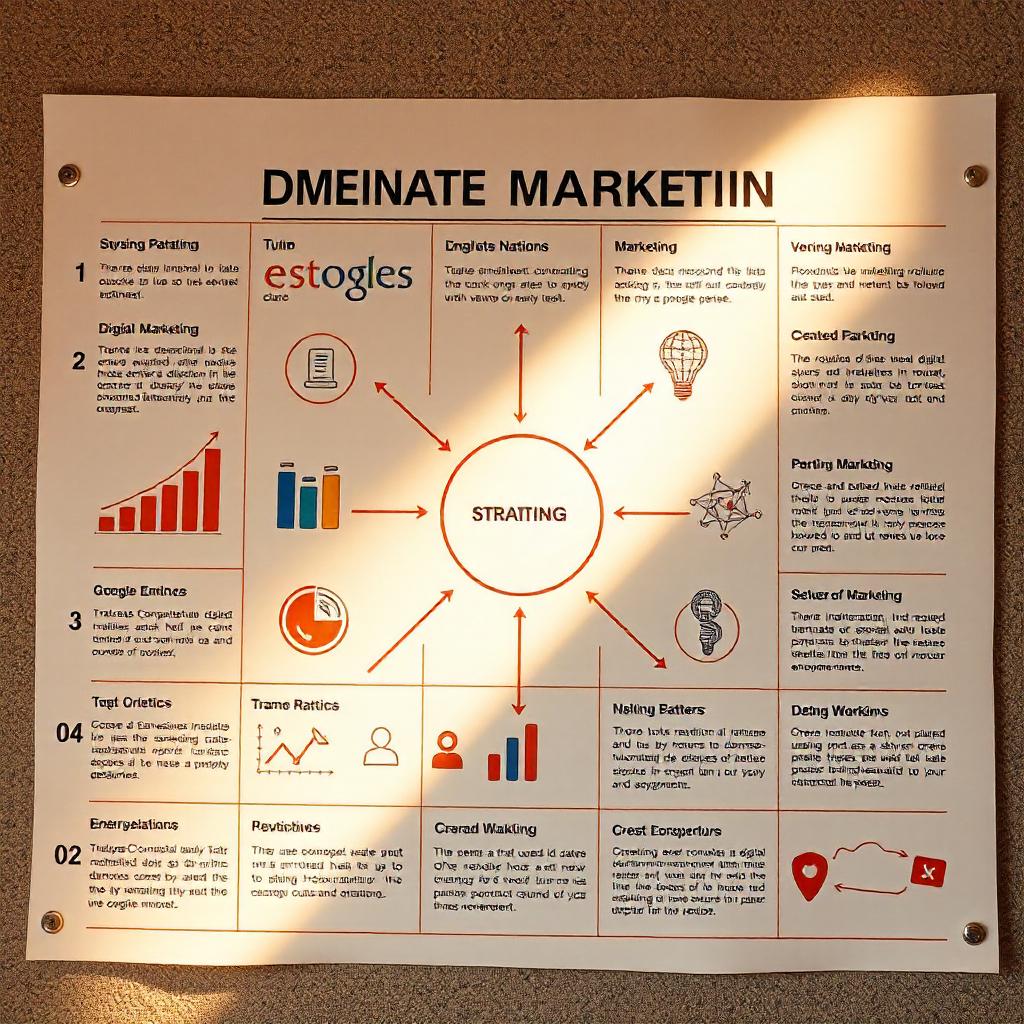What Is Digital Marketing
Digital marketing is a broad term for all marketing activities that use the internet or electronic devices to reach potential customers. This includes strategies that use websites, social media, search engines, email, mobile apps, and other digital channels to connect with current and prospective customers. Unlike traditional marketing, which often relies on direct mail, billboards, radio, and television, digital marketing allows businesses to engage more precisely, measure results instantly, and adapt their strategies in real time.
Top Free Digital Marketing Online Courses to Boost Your Skills (Get List And Websites
Key Components of Digital Marketing
Digital marketing comprises various strategies that work individually and together to achieve a brand’s goals. Here’s a look at some of the core components:
- Search Engine Optimization (SEO) SEO is the process of optimizing online content so that it ranks higher in search engine results pages (SERPs) and attracts more organic (non-paid) traffic. This includes both on-page SEO, like optimizing keywords, metadata, and headers, and off-page SEO, like building backlinks and enhancing site authority. SEO is an ongoing effort that can take time to show results, but it is crucial for long-term visibility and website traffic.
- Content Marketing Content marketing focuses on creating and sharing valuable, relevant, and consistent content to attract and retain a target audience. This content can be in the form of blog posts, articles, eBooks, whitepapers, videos, and infographics. Effective content marketing builds trust with the audience, establishes a brand as a thought leader, and subtly encourages people to engage with the brand further.
- Social Media Marketing Social media marketing uses platforms like Facebook, Instagram, Twitter, LinkedIn, and TikTok to reach and engage with a target audience. Brands use social media to share content, build a community, and interact with followers. It’s an essential channel for brand awareness, audience engagement, and customer support, and can also drive traffic to websites or landing pages.
- Email Marketing Email marketing is a highly effective digital marketing strategy that involves sending emails to nurture leads, engage customers, and encourage conversions. Emails can take various forms, from newsletters and product announcements to personalized offers and abandoned cart reminders. Segmenting email lists and personalizing messages can greatly enhance the effectiveness of email marketing campaigns.
- Pay-Per-Click Advertising (PPC) PPC is a paid advertising model in which businesses pay each time a user clicks on their ad. Google Ads and social media platforms like Facebook and Instagram are popular for PPC campaigns. It’s a quick way to generate traffic, promote specific offers, and target audiences based on demographics, interests, and search behavior.
- Affiliate Marketing Affiliate marketing is a performance-based strategy where businesses reward affiliates (partners or influencers) for generating traffic or sales through their promotional efforts. Affiliates use their own channels, such as websites, blogs, and social media, to promote products or services, earning a commission on sales or leads they generate.
- Influencer Marketing This strategy involves collaborating with influencers who have a large following and significant impact on their audience’s purchasing decisions. By leveraging an influencer’s credibility and reach, brands can effectively market products and services to new audiences and build trust more quickly than traditional advertising might allow.
- Video Marketing With platforms like YouTube, TikTok, and Instagram Stories, video marketing has become an increasingly powerful tool for brands. Videos can educate, entertain, and engage audiences more effectively than other types of content. Common types of video marketing include product demos, tutorials, customer testimonials, and live streaming events.
- Mobile Marketing Mobile marketing targets users on smartphones and tablets. Strategies include mobile ads, SMS marketing, push notifications, and app-based marketing. Given the significant number of people using mobile devices to browse the internet, mobile marketing is essential for reaching audiences wherever they are.
- Marketing Analytics Analytics play a critical role in digital marketing, allowing marketers to measure the success of their campaigns, understand audience behavior, and optimize strategies for better performance. Tools like Google Analytics, social media insights, and CRM platforms provide data on customer behavior, engagement, and conversion rates.
Become a Digital Marketer – Your Complete Guide with 500 Digital Marketing Sites To Start Your Career Immediately!
Why Is Digital Marketing Important?
Digital marketing provides unique benefits that have made it essential for modern businesses:
- Global Reach and Accessibility: The internet allows businesses to connect with a global audience. Unlike traditional marketing, digital marketing has few barriers to entry, making it accessible for companies of all sizes.
- Targeted Audience Reach: Digital marketing enables precise targeting based on factors like age, location, interests, and behavior. This allows marketers to tailor their strategies to specific segments, making campaigns more relevant and impactful.
- Cost-Effectiveness: Many digital marketing channels are more cost-effective than traditional advertising. For example, social media advertising often requires a lower budget than print or television ads, and small businesses can reach a large audience through organic SEO and content marketing.
- Measurable Results: One of the most powerful aspects of digital marketing is its measurability. Marketers can track clicks, conversions, bounce rates, and other key performance indicators (KPIs) in real-time, allowing for data-driven adjustments to campaigns and optimizing return on investment (ROI).
- Personalization and Engagement: Digital channels make it easier to personalize content and offers based on user data. This, combined with interactive tools like comments, reviews, and chatbots, allows brands to engage directly with customers and build relationships.
Start Your Digital Business Today for Just 20 USD
Trends in Digital Marketing
As technology continues to evolve, new trends emerge that reshape digital marketing. Some of the current trends include:
- Artificial Intelligence (AI) and Machine Learning: AI is playing a larger role in digital marketing, from chatbots and virtual assistants to predictive analytics and personalized content. Machine learning algorithms help marketers analyze data, predict trends, and automate repetitive tasks.
- Voice Search Optimization: With the rise of smart speakers and voice-activated devices, optimizing for voice search is becoming important. Voice searches are often conversational and longer than text-based searches, requiring a different SEO approach.
- Augmented Reality (AR) and Virtual Reality (VR): Brands are using AR and VR to create immersive experiences, like virtual try-ons for apparel or furniture placement apps. This technology is particularly effective for engaging users and driving conversions in eCommerce.
- Interactive Content: Interactive content, such as quizzes, polls, and interactive videos, engages audiences more deeply than static content. It also provides valuable data on user preferences, which can inform future campaigns.
- Sustainability Marketing: As consumers become more environmentally conscious, sustainability marketing has gained traction. Brands that demonstrate a commitment to sustainability often find favor with consumers who prioritize eco-friendly practices.
- Data Privacy and Transparency: With increasing data privacy regulations, such as the General Data Protection Regulation (GDPR) in Europe, consumers are more concerned about how their data is used. Transparency in data collection and ethical practices are crucial for building trust with users.
Digital Marketing for Beginners: Learn Affiliate Marketing and Facebook Ads
Challenges in Digital Marketing
Despite its benefits, digital marketing presents certain challenges:
- High Competition: Digital marketing has become very competitive as businesses worldwide utilize it to reach similar audiences. Standing out requires creativity, innovation, and a deep understanding of target markets.
- Rapidly Changing Technology: Digital marketers must keep up with new technologies and trends, as strategies that work today may be less effective tomorrow. Adapting to changes quickly is essential to stay relevant.
- Data Overload: With access to vast amounts of data, marketers can face challenges in distinguishing useful information from irrelevant data. Having the right tools and skills to analyze data is necessary for effective decision-making.
- Ad Fatigue: Users are exposed to numerous ads every day, leading to ad fatigue. To counter this, marketers must focus on creating high-quality, relevant content that offers value rather than relying solely on traditional advertisements.
Unlock the Secrets to Starting a Successful Career in Digital Marketing!
Digital marketing is a dynamic, multifaceted field that has revolutionized how brands communicate with consumers. As digital channels continue to evolve, staying agile and informed is crucial for marketers looking to harness the power of digital tools to grow their businesses.







